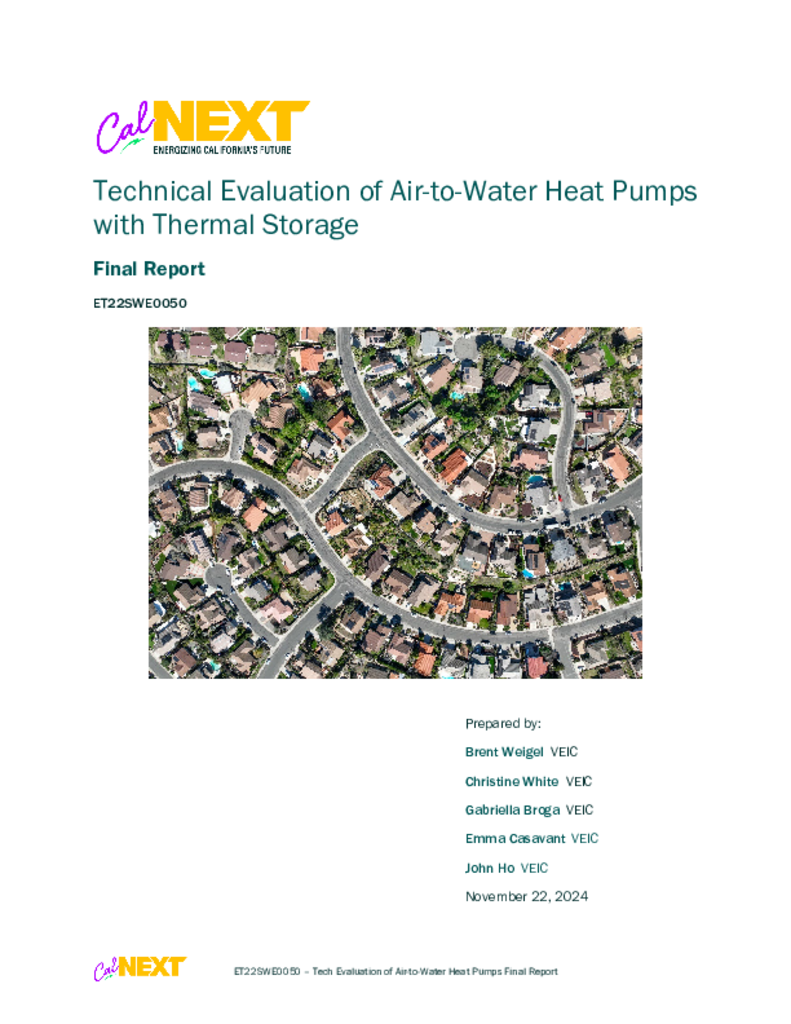ET22SWE0050 - Tech Evaluation of Air-to-Water Heat Pumps
Home space heating, space cooling, and domestic hot water heating loads can be served efficiently by contemporary air to water heat pump technology. Higher operating efficiencies and a shift of loads from peak to non-peak demand periods can be achieved through a shared network of hydronic piping coupled to thermal energy storage. Utilization of water as a thermal energy storage medium enables the use of conventional hydronic space heating, and domestic hot water heating equipment for an integrated thermal energy storage system in residential applications.
VEIC proposes to conduct a literature review on integrated thermal energy storage technology and a field study of one manufacturer’s controls and packaged solution for single-family residential buildings for energy efficiency and peak load reduction. The literature review will examine publicly available and manufacturer developed research and data on the system packaging and controls technology, performance models, and previous field testing results of storage systems integrated with heating, and domestic hot water heating.
The field study will build upon a pilot study of Harvest Thermal technology performed by Peninsula Clean Energy between May 2022 and April 2023. It will evaluate a new capability of the Harvest Thermal technology with the SANCO2 air-to-water heat pump to control a supplemental air-to-air heat pump providing both cooling and heating. This feature is designed to augment the peak capacity of the air-to-water heat pump and thermal energy storage system, thereby making the benefits of the system accessible to a broader set of homes. The Harvest systems evaluated in the Peninsula Clean Energy study were limited to 24 kBTU/hr design loads and did not provide air conditioning. This study will evaluate systems serving up to 36 kBTU/hr design heating and cooling loads.
The study will evaluate systems installed in at least two single-family homes in California. The systems will comprise of a commercially available air-to-water CO2-refrigerant heat pump, domestic hot water storage tank, air handler (i.e. fan coil unit) containing both a hydronic coil and a refrigerant coil, a supplemental air-to-air heat pump for cooling and heating, and a Harvest Thermal proprietary control system.
As part of the field study, we propose to perform measurement and verification (M&V), to evaluate the efficiency, load shift potential, and cost-effectiveness of water-based thermal energy storage systems for integrated space heating and domestic hot water heating in single-family, residential buildings in California. The evaluation will quantify the potential whole-building energy efficiency, peak demand reduction, and owner economics of the integrated systems.
The study will assess the appropriateness of such systems for existing and new California single-family homes in terms of cost to owners, cost to utilities, and public benefits. The results of the study can inform utility-sponsored programs for energy efficiency and load shift / load reduction.
This report provides results from a market assessment and pilot study of efficient residential air-to-water heat pump technologies with load-shift capabilities through coupled thermal energy storage and supplemental air-source heat pump cooling. Results quantify the energy and cost savings, cost effectiveness, and emission reduction potential of shifting space heating loads to off-peak times, an essential strategy to alleviate grid constraints as more homes in California electrify their end uses. The market assessment is informed by a literature review of the available technologies and components, as well as publicly available results from studies conducted on packaging and controls technologies, system performance models and field testing of storage systems integrated with heating, cooling and domestic hot water heating. Development of the pilot study stemmed from the market assessment results and data gaps identified in the market. The team recruited four single family households in California to participate in a field testing of the technology during typical household operation. A commercially available heating and hot water system consisting of an air-to-water heat pump with integrated thermal energy storage, supplemented with an air-source heat pump for cooling and supplemental heating was installed in each home. Data were collected while the system operated in both a baseline mode and load-shift mode to understand differences in energy use and to compare costs based on utility time-of-use rates for peak, partial peak and off-peak times.

